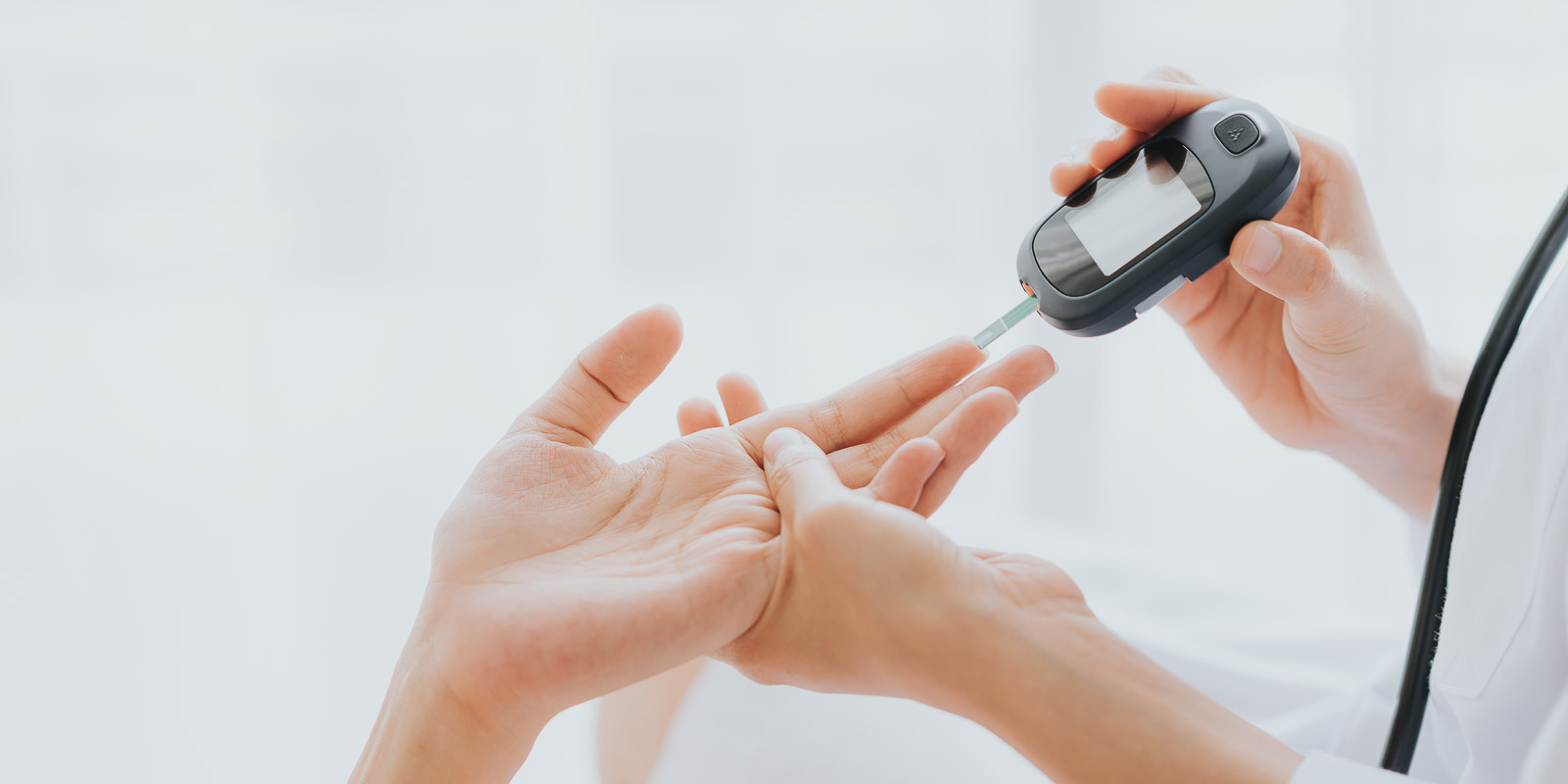
Diabetes Care
Quick Links
Related Services
Additional Resources
About
Discover a healthier future with Hunt Regional Healthcare's comprehensive diabetes care services. Our dedicated team is here to guide you on your journey to maintaining optimal blood sugar levels. Gain valuable knowledge about managing your diabetes through tailored education, empowering you with the tools to make informed decisions about your health.
Understanding Diabetes
Are you worried about your risk of developing diabetes? Gain valuable insights into the different types of diabetes, understanding the unique risk factors associated with each and common symptoms that are associated with Diabetes.
Type 1 Diabetes
Type 1 diabetes is a chronic condition in which the body doesn’t produce enough insulin. People with type 1 diabetes need to receive insulin injections or use an insulin pump to manage their blood sugar levels. It usually starts in childhood or early adulthood.
Type 2 Diabetes
Type 2 diabetes is a chronic condition in which the body becomes resistant to insulin or doesn’t produce enough of it. As a result, people with type 2 diabetes may need to manage their blood sugar levels through lifestyle changes (such as diet and exercise), medications, and/or insulin injections. It is more common in adults and is often associated with obesity and a sedentary lifestyle.
Gestational Diabetes Mellitus
Gestational diabetes mellitus (GDM) is a type of diabetes that occurs during pregnancy. It happens when the body cannot produce enough insulin to regulate blood sugar levels during pregnancy, and it usually goes away after delivery. GDM can increase the risk of complications during pregnancy and delivery, and it also increases the risk of developing type 2 diabetes later in life.
- Fatigue
- Frequent urination
- Excessive thirst or hunger
- Weight loss despite increased hunger
- Vision changes
- Frequent infections
- Tingling or numbness in the hands or feet
If you have noticed one or more of these symptoms, let your primary care doctor know so that additional steps can be taken.
- Urinalysis showing glucose and ketone bodies in the urine
- Glucose tolerance test
- Glycosylated hemoglobin level
If a diabetes diagnosis is confirmed, our team at Hunt Regional’s Diabetes Self-Management Center will be ready and waiting to help. To learn more about our diabetes care and education programs, call us at 903.408.5130.
You can’t change some things like age or ethnicity, but it is important to be aware of your risks and work toward changing things you can, like your diet, weight, and exercise levels.
Factors that increase the risk of diabetes
- Family history of diabetes
- Age over 45
- Race or ethnic background
- Metabolic Syndrome
- Being Overweight
- Hypertension
- Abnormal cholesterol levels
- History of gestational diabetes
Potential complications from diabetes
- Hypoglycemia
- Hypertension
- Dyslipidemia
- Cardiovascular disease
- Heart Attack
- Stoke
- NBlindness and eye problems
- Kidney disease
- Amputations
Services
Diabetes Education Program
At Hunt Regional Healthcare, we understand that a diabetes diagnosis can be intimidating. You might even feel like you have no control. But we want you to know you can take control of your condition by embracing healthy behaviors – and through our education program, we can help you achieve this important goal.
Topics We Will Explore Together
- How to check your blood sugar levels
- How often you should check your blood sugar levels
- What your ideal blood sugar levels should be
- How to create a meal plan that meets your needs
- How physical activity positively impacts diabetes
- How often you should exercise and for how long each workout session should last
- The positive impact weight loss has on diabetes management
- What types of exercises best fit your physical needs and/or limitations
- Stress and anxiety – how it can increase your blood sugar levels and ways to handle it
- Depression – the correlation between diabetes and depression, symptoms to be aware of and how to get the help you need to improve your mental health
- Dealing with lifestyle changes – how to find support in adopting new healthy behaviors (i.e. eating well and exercising) and quitting unhealthy ones (i.e. smoking and alcohol consumption)
- Changes in your vision that should be brought to your doctor’s attention
- The importance of brushing and flossing on a daily basis
- How to check for wounds on your feet that are not healing
- What your ideal blood pressure should be, and how often you should have it checked
- And more
Diabetes Nutrition and Weight Loss Counseling
Proper nutrition is an essential part of managing diabetes. But just because it's important, doesn’t mean it has to be complicated. Many people are of the belief that those with diabetes must stick to a very strict and special diet. But the truth is, if you have diabetes, your general dietary needs are pretty much the same as everyone else’s. What you really need is a strong awareness of the food choices you are making – this is where our experts can help.
At Hunt Regional Healthcare, our registered dietitians can help you better understand the “science of nutrition,” and teach you how to pick the right foods to manage your diabetes. Additionally, our experts will also take time to review your diabetes diagnosis, personal dietary history and nutritional needs. When you meet with one of our registered dietitians, he or she will:
Review your current eating habits
Evaluate your current nutritional status
Help determine your nutritional needs
Help you set personal nutrition goals
Educate you on how to make good food choices
Assist you with diabetes meal planning – both for eating in and dining out
All of our diabetes nutrition sessions are by appointment and require a referral from your doctor. To get started, have a conversation with your primary care physician or specialist about diabetes self-management through nutrition counseling. We also encourage you to learn more about our other services, which include diabetes education and weight loss counseling.
Did you know that being overweight or obese is common among those who have Type 2 diabetes? According to the Centers for Disease Control, those who have a body mass index (BMI) of 25-29 are considered overweight, and those who have a BMI of 30+ are designated as obese.
Do you know what your current body mass index is? Calculate your BMI.
Having an awareness of your weight and body mass index is important, especially if you have diabetes. Not only does extra weight contribute to high blood sugar, it can cause high cholesterol and high blood pressure levels, leading to an increased risk for heart disease and stroke. This makes weight loss a vital part of diabetes management for many people who have been diagnosed.
At Hunt Regional Healthcare, our diabetes weight loss counseling team can help you determine:
Your current weight and BMI
Your target weight and BMI
From there, we can aid you in managing your weight as well as your Type 2 diabetes, by helping you adopt positive lifestyle changes – namely, changes in the way you eat and exercise.
Thinking about the way you are currently eating, do you:
Know how many calories you consume each day?
Know how many calories you should be consuming each day?
Make it a point to eat breakfast each day?
Know which foods you should be incorporating into your diet?
Know which foods you should be eating in moderation?
Try to control your portion sizes?
Consume alcohol in moderation?
If the answer is no to any of the above, our team can help you get the diabetes nutrition guidance you need. Registered dietitians are available to:
Evaluate your current nutritional status
Help you determine your nutritional needs
Help you set nutrition goals
Educate you on how to make healthy food choices geared toward weight loss and diabetes management
In addition to eating well, being physically active is another way to support healthy weight loss and diabetes management. Work with our team to learn:
How often you should be exercising
Which types of exercises are effective at burning fat/calories
Which activities are a good fit for your personal needs/limitations
Additional lifestyle changes such as quitting smoking or the use of other tobacco products, and managing stress can also aid in weight management.
To learn more about weight loss counseling at Hunt Regional or our other diabetes self-management services, give us a call at 903.408.5130.

